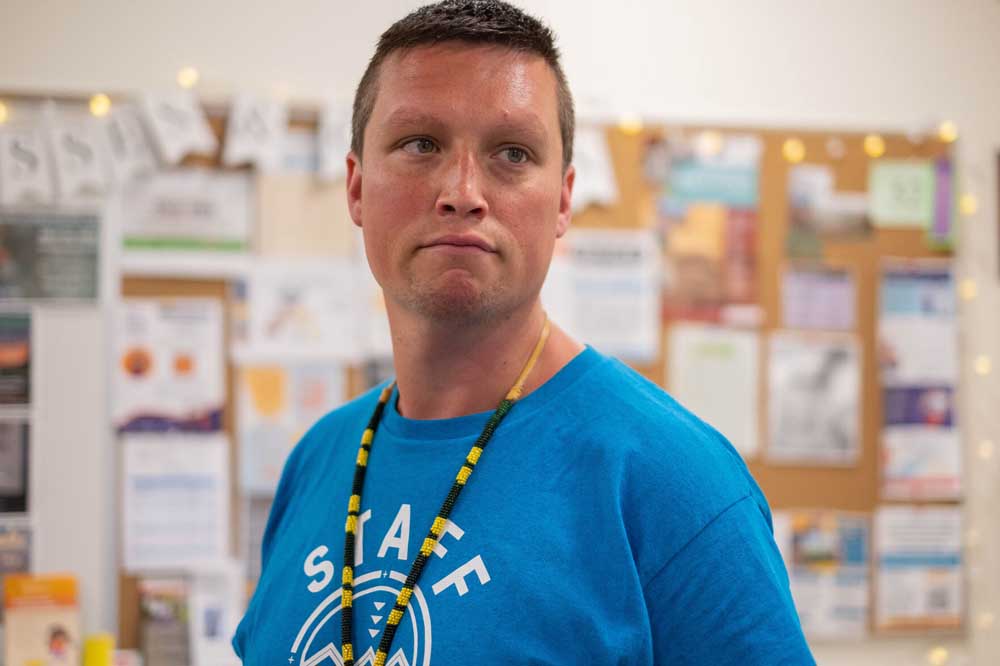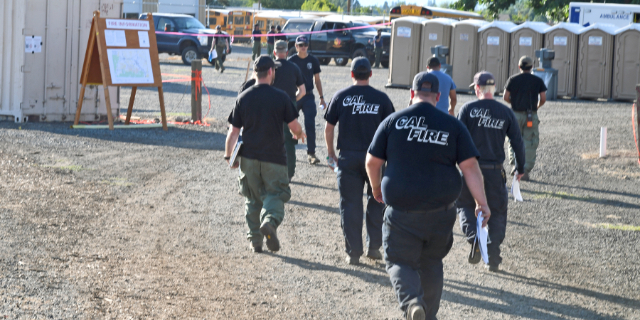Yellowhawk Tribe works to break stigma of mental health services
Published 7:00 am Sunday, July 23, 2023

- Cody Cimmiyotti, suicide prevention coordinator of Yellowhawk Tribal Health Center, Mission, expresses the importance of suicide prevention July 11, 2023, and ways to help those who are battling depression and mental issues at the.
MISSION — Mental health concerns are on the rise — anxiety, depression, suicide, chemical dependency — and numbers have been skyrocketing ever since COVID-19, “especially for our youth,” said Cindy Cecil, behavioral health clinical director at Yellowhawk Tribal Health Center.
Trending
“Kids being socially isolated while online homeschooling and having more access to social media and other digital platforms definitely escalated a lot of the mental illness that we see now,” Cecil said.
And the staffing shortage in the field of behavioral and mental health does not help, Cecil said. “It’s a tough, tough job.”
“Folks are still going to school for social work, but after that,” Cecil said, “I don’t know.”
Trending
“But burnout is real too,” Cecil said. “You are involved and engaged in a very personal side of people, and we help people work through what they are going through, but you also are taking on a lot of those issues yourself, every single day. You have that stuff on you. It doesn’t go away. You are taking on the issues, the traumas, of whoever is on your caseload.”
“That is why I preach self-care to staff,” Cecil said. “You have to take care of yourself to be able to take care of others.”
So working in mental and behavioral services is a challenge due to a rising number of people needing services and staffing shortages, resulting in more work for any one individual in the field, but another big challenge, Cecil said, is the stigma surrounding mental and behavioral health services.
For example, Cecil explained, someone is more likely to acknowledge their medical provider out in public than they are to acknowledge their mental health provider — because then other people would label you as someone who is receiving mental health services. And there is a stigma attached to that.
“Our primary role as behavioral health employees,” Cecil said, “is to try to break that stigma every single day.”
Cecil equated medical and mental services by saying that if you break a bone or are feeling really sick, you are going to go seek out medical attention, so why wouldn’t someone do the same for their mind, their brain? The brain is a part of the body too.
“If you are not feeling good, there is no shame or guilt in that,” Cecil said. “That’s what we are here for. Everybody needs help at times.”
Yellowhawk’s integrated health center model has been a great step towards normalizing mental health services, Cecil said. It’s a one-stop shop for healthcare — behavioral health, medical, physical therapy, lab and radiology, pharmacy, dental, optometry, and public health.
As a result of a comprehensive healthcare facility, Cecil has said that their numbers for mental health services have gone up. They have been able to help more people.
She also said it is a model that a lot of other healthcare providers reach out to Yellowhawk about to inquire.
“But anything we can do to be out in the community is working to break the stigma,” Cecil said. “We cannot silo ourselves.” Raising awareness is crucial, she said.
Community outreach is what Abel Lozano, a peer recovery mentor, spends a lot of his time doing.
Lozano said, “You have to meet people where they are at to engage them, to show them that recovery is possible.”
And right now, Lozano said, fentanyl is everywhere, and people might not even know what they are using or doing is fentanyl.
A barrier to receiving services, Lozano said, is often a person’s own belief of a stigma, but people really do care and want to help those who are struggling. We have to raise awareness, he said.
Another tool, “and my baby,” Cecil said, that is used to tackle the stigma is the Family Strength Program. The program is about offering wrap-around community and school-based services for children and families in order to heal and achieve a healthy lifestyle. Services include case management, mental health therapy, mentoring, skills building, and cultural activities and resources.
Cecil said a lot of what they do to help people is culturally specific and culturally appropriate. “We encourage cultural practices — powwows, dancing, kayaking, sweat, regalia-making, huckleberry-picking, drumming.”
Reducing stress, anxiety, and the urge to use substances is the goal, Cecil said.
Some newer opportunities include acu-detox and equine therapy, equine therapy becoming more and more popular all over the place.
Cody Cimmiyotti, suicide prevention coordinator, said a big concern of his is that the tribal suicide rate is about two times the national average.
Cimmiyotti has recently been working on establishing, maintaining, and growing a curriculum called First Nation Youth Suicide Prevention in local schools through Title VI classes. The curriculum is integrated into the class about once a week.
“Kids are really open to talking about it, but there is some resistance too,” Cimmiyotti said. “Kids sometimes think they will get in trouble or get judged by others if they do talk about suicide.”
There is a stigma, but “culture is prevention,” Cimmiyotti said. “You have to give people something to look forward to. Something healthy.”
Cecil also spoke to the power of culture and how culture empowers people to work through their issues.
There is power in culture, she said. “Learning and teaching culture keeps you strong, it keeps you thriving. Culture gives you purpose, and people need purpose. Absolutely.”
“And culture is about identity,” Cecil said, “feeling comfortable in your own skin.”
When it comes down to it though, Cecil said, “Never force or pressure someone to receive services. You just have to use a nurturing voice and let someone know that services exist.” A person needs to make that choice and take that first step for themselves, and step by step, we can break this stigma together, she said.









